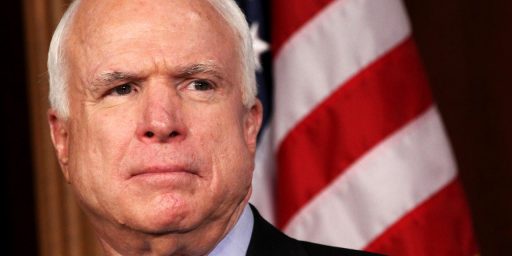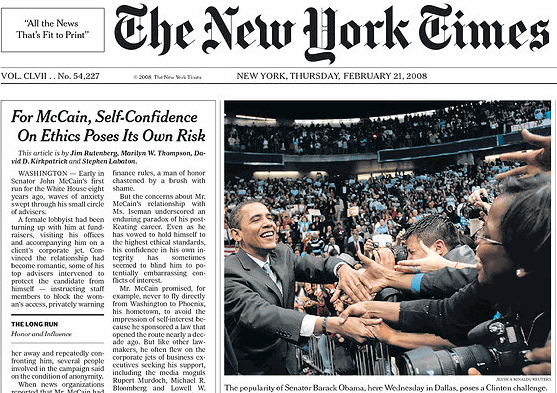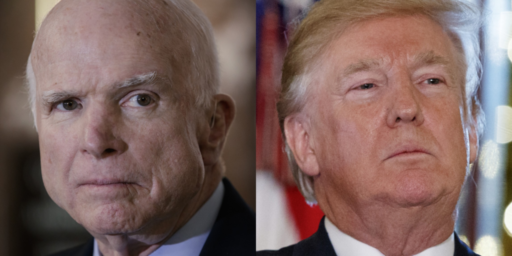1 in 7 Voters Persuadable
A new poll claims that a whopping 14 percent of likely voters think they may still change their minds in the five days remaining before the election.
One in seven, or 14 percent, can’t decide or back a candidate but might switch, according to an Associated Press-Yahoo! News poll of likely voters released Friday.
Who are they? They look a lot like the voters who’ve already locked onto a candidate, though they’re more likely to be white and less likely to be liberal. And they disproportionately backed Hillary Rodham Clinton’s failed run for the Democratic nomination.
For now, their indecision remains intact despite the fortunes that have been spent to tug people toward either McCain, the Republican, or the Democrat Obama. Fueling their uncertainty is a combination of disliking something about both candidates and frustration with this campaign and politics in general.
Ordinarily, I use the term “undecided voter” interchangably with “idiots” and “non-voters.” In most races, even when there’s not a candidate I’m excited about, it’s simply astounding to me that someone couldn’t decide given the stark differences between the Republican and Democratic candidates.
Not so much this year. Even our own Dave Schuler was still, as of Wednesday evening’s edition of OTB Radio, not firmly decided (although he’s leaning ever-so-slightly towards Obama). Many people who normally vote Democrat are truly worried about Obama’s seasoning. Many people who normally vote Republican are concerned about McCain’s temperament and the risk of Sarah Palin ascending to the presidency.
Moderates seem to prefer McCain on foreign policy but would rather have Obama calling the shots on the economy and health care. Obama has to deal with the Clinton dead-enders (the so-called PUMAs) and McCain has to fire up conservatives who don’t trust him.
That said, I simply don’t believe the numbers here. My strong hunch is that the overwhelming preponderance of self-identified “persuadables” are either trying to appear open-minded or are simply reluctant partisans. The real number is likely somewhere around the 6.5 percent currently unaccounted for in the RealClearPolitics average.
These people will, I believe, break disproportionately — perhaps 2-to-1 or even 3-to-1 — for John McCain. After all, they’re overwhelmingly people who voted for George W. Bush the last two cycles and who haven’t yet jumped on the Obama bandwagon. Given that Obama’s within a rounding error of 50 percent both nationally and in enough of the states Bush won in 2000 and 2004 to win in the Electoral College, however, I don’t think it’ll be enough.





The internal Republican polling numbers are suggesting 4 to 1 as of this morning.
That strikes me as wildly optimistic. Even if the PUMAs go half and half, it’s not going to be 4 to 1. Further, if my instinct is right that the persuadables are only 6.5 percent, the additional 1.3 percent would push Obama over 51 percent nationally.
Well, we’ll see, James, but I have to tell you that Pumas are NOT going half and half. Even as measured outside the ‘puma’ name, Democrat undecided voters are going overwhelingly for McCain in every state I asked about… all of them battleground states.
With all due respect to Dave, this election should not change your use of the term “undecided voter.”
Is legitimate voting still relevant?
31 states have adopted measures to encourage,no… guarantee, widespread vote fraud.
We had no primaries, we had no conventions,so what follows logically?
I will vote anyway, even though I live in Illinois, where there may be a few undecided voters, but no undecided votes.
“Ordinarily, I use the term “undecided voter†interchangeably with “idiots†and “non-voters.â€â€
James, I usually like your post and understand your emotion behind that statement. However, if you really think that you may fall under one of those categories. For many of us who keep up on politics, we made up our minds long ago. However there are those that see no reason to make a decision until it is necessary. One can never know what may happen or be revealed. Also some share certain policies philosophies with each candidate and need that tipping point. I don’t think I need to go on.
That said, it is clear choice for me but understand how it is not for others.
An interesting question. It bears on the accuracy of polling, in the following way: Pollsters, even Democrat pollsters, when gathering their numbers, tend to stick to people who can legally vote. Given the level of vote fraud we already know about, it seems to me reasonable to suggest that the final outcome of the voting may be altered by illegal votes.